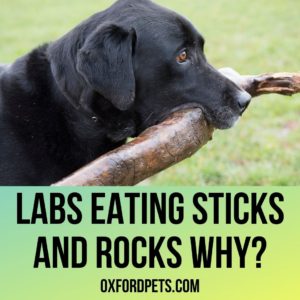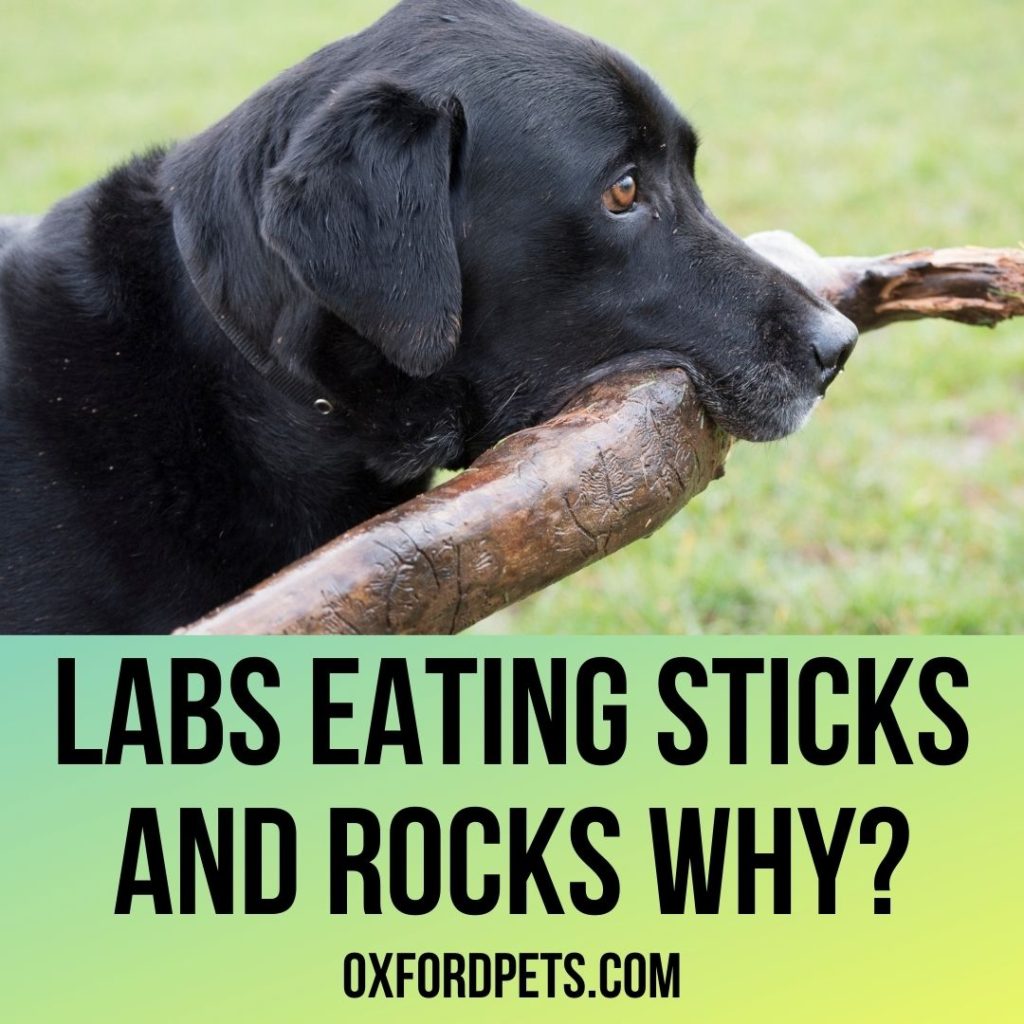Having a pet Labrador is always an overwhelming feeling. However, these popular canines often confuse owners for some reason. For example, there could be some days when you will find your Lab munching on sticks, rocks, socks, and other non-edibles. For some, it may be cute to see your dog enjoying his time, but that’s not something safe going around.
It isn’t normal for Labradors to eat sticks, rocks, and other non-edibles, but it isn’t uncommon as well. Dogs chew on all kinds of weird things, and a few of them can prove extremely dangerous for them. Not just that, but if your dog is constantly chewing/ munching on non-edibles, there could be some underlying medical condition leading to the same.
Why Do Dogs Chew Dirt, Stones, And Trash?
Labradors, or dogs in general, chew non-edible dirt, stones, and trash normally due to stress and anxiety. Not just that, but dogs pick and chew on these items to satisfy their curiosity or explore all the things around them.
In addition, if your dog is suffering from Anemia or any kind of nutritional deficiency, he will find mineral supplements through rocks and pebbles to satisfy their diet. Most of the time, this behavior can have many basic reasons, but it can pose a serious threat to your dog’s health.

8 Reasons Why Dogs Eat Stones and Rocks (Why Does My Lab Eat Rocks?)
If your dog is eating stones and rocks, it is a behavioral, psychological, or medical problem. Dogs can do so out of,
- Curiosity
- Boredom and Loneliness
- Deficiency
- If they are suffering from Intestinal Parasitical Infection
- If they are suffering from some gastrointestinal problem
- If they have diabetes mellitus
- Due to some kind of nutritional deficiency.
- Or if they are suffering from Pica.
How Do I Get My Lab To Stop Eating Rocks?
Rocks certainly give no benefit to dogs, and it is even dangerous to chew them. Eating rocks can create an intestinal blockage, internal rupture or bleeding, rectal tears, internal hemorrhage, blockage, constipation, poisoning, or so. Therefore, keeping the dog from even taking rocks in its mouth is extremely important. Here are a few tips for doing the same:
- Modify the area and make sure you remove all the stones. This is one of the most straightforward ways of keeping your dog from eating stones.
- Positive reinforcement and balanced training can help you from keeping your dog’s stone-eating behavior at bay.
- Use Command training in order to control your dog’s stone-eating habit.
- Use Muzzle training.
How Do I Get My Lab To Stop Eating Trash?
Eating trash, however, isn’t safe due to all obvious reasons. If it is trash, no one, even the most neglected animal, should eat it. Therefore, if your dog is often keen about exploring the trash, here are a few things you can do to stop him:
- Always keep your garbage bin closed and also away from your dog’s reach. Your garbage bin should have a tight lid that no animal or bird should be able to access.
- Use commands in order to keep your dog from eating trash from the road. Use Commands like ‘Stop,’ ‘No,’ ‘Back Off,’ etc.
- While you both are out for a walk, keep your dog muzzled.
Why do Dogs Eat Trash?
Trash and Garbage, at times, can appear as an all-you-can-eat buffet for dogs. Dogs eat trash simply because they are hungry or when they have spotted something interesting there. It is just food that appeals to the pooch, and they will munch on it simply to satisfy their hunger.
Why Do Labradors Eat (Poop, Grass, Bees, Dirt, Socks)?
Labradors eat a range of non-food items, and the reasons behind the same can be many. Depending upon what they are trying to chew or eat, every non-edible thing they have has an explanation behind it. Here’s a brief explanation of all the Non-edibles Labradors eat and why they do so:
Explanation ‘Why Labradors eat Poop’? It isn’t uncommon to spot a dog who is eating his own poop. But have you ever wondered why? Well, dogs have a tendency to eat feces either of their own or others. Poop eating is a natural canine behavior, and most dogs follow it at some other point in their life.
Labradors or dogs, in general, eat poop and even baby poopy diapers, sanitary pads when they are suffering from a condition known as Coprophagia. Coprophagia is common in dogs, but it can be corrected as well. Whereas on the other hand, some studies believe that dogs eat poop due to an inherited behavior from their ancestors’ Wolf. Following wolves, some dog eats their poop to clean their sleeping area, though this claim hasn’t been studied enough yet.
In addition, Labradors also eat poop in order to satisfy their curiosity. Or, dogs who are suffering from some kind of nutritional deficiency too will eat poop in order to gain their vital backs.
Explanation ‘Why Labradors eat Grass’? It is very common for dogs to eat grass from time to time. Eating grass is a dog’s physical need, and they do so in order to relieve upset stomachs. Grass is a good source of fiber, and it fulfills the need for roughage in a dog’s diet. Since lack of roughage can affects the dog’s ability to digest food and pass stool, eating grass can actually help them.
Some dogs also eat grass if they are bored, stressed, or anxious. They may do so simply to gain their owner’s attention.
So, Is grass a good snack for dogs? Even though when your dog loves munching on grass, it isn’t the best snack for him. While eating grass directly from the ground, your dog may sometimes pluck the toxic leaves as well.
Or, since many greens are sprayed with herbicides and pesticides, eating them can be harmful to the dog. Eating grass can also be a reason for intestinal parasites in your dog, and mind it, this can be quite troublesome. That is why, if your dog has an upset stomach, it is better to consult a Vet first before allowing him to have grass on the ground.
Explanation ‘Why Labradors eat Bees’? Labradors try to eat Bees simply out of curiosity since Bees constantly move. Dogs are either attracted to or annoyed with Bees’ movement. They chase and eat them either out of curiosity or annoyance.
Though eating Bees can sometimes prove slightly painful for dogs. Bees aren’t poisonous, but they are definitely venomous. While your Labrador catches the Bee, it could possibly sting your dog. A bee sting can possibly cause mild swelling, reddening, and itching and can keep the dog troubled for some time. In the worst-case scenario, eating Bees can, at times, also prove life-threatening for dogs.
Explanation ‘Why Labradors eat Dirt’? Labradors or dogs generally enjoy eating dirt, and there could be a number of reasons responsible for the same. Labradors eat dirt if they have an Upset stomach, Gastrointestinal disturbance, Nutritional imbalances or deficiencies, or Anemia.
Since dirt may contain pesticides, fertilizers, or other toxins, ingesting it can prove dangerous.
Explanation ‘Why Labradors eat Socks’? Labs can eat socks, underwear, or other such cloth items if it has their owner’s smell. Some dogs do so while they are teething, while others do so simply out of curiosity or boredom. However, if your Lab is excessively focused on eating socks and other such clothes, it is better to take them to a Vet for some diagnosis and expert opinion. The behavior isn’t very safe and thus needs expert guidance.
Is It Ok For My Lab To Eat Sticks?
No, allowing your dog to eat sticks can prove risky for the pooch. It may be fun for the dog, but chewing sticks can damage their teeth and gums. In the worst-case scenario, it can also lead to teeth fractures that cannot be reversed again.
Stick or even the tiniest part of it, when swallowed, can cause extreme malfunction inside the dog’s system. It can cause blockage, rupture, and cause bleeding, along with more such problems. Therefore, whenever you see your dog eating sticks, stop him there and then.
How Can I Stop My Dog from Eating Sticks?
If your dog has found his new obsession and wants to eat sticks all those times, here’s all that you can do:
- Block your dog’s access to the areas that have sticks, mulch, and small wood blocks.
- Clear your backyard of all kinds of sticks.
- Never encourage their behavior; use Command training to keep them under control.
- Give your dog a chewable bone while they are looking for sticks to chew.
- Keep the dog muzzled.
How Do I Know If My Dog Has Pica? Remedies For Pica
Pica is an eating disorder (both medical and physiological) that hits both humans and animals. Dogs suffering from Pica will tend to eat things that are not even considered edible, including stones, tree bark, rocks, mud, trash, etc.
Pica is commonly a compulsive behavior problem that can lead to serious health problems in dogs. If your pooch is eating non-food items, the condition is serious and needs Vet intervention soon. American Society for Prevention of Cruelty to Animals (ASPCA) suggests that Pica does not goes on its own and therefore requires treatment urgency.
For diagnosing Pica, your Vet will perform a physical diagnosis that will include the following:
- Checking lungs and heart with a stethoscope.
- Checking the dog’s weight, coat, skin, inside ear, nose, and mouth.
- Palpation of the stomach and lymph nodes
- Along with a physical diagnosis, the Vet may also suggest a complete blood count (CBC), urinalysis, and a serum biochemistry profile. Along with that, an X-ray to rule out any chances of internal blockage may also be performed.
Remedies for Pica in Labs
Since Pica is a compulsive behavior problem, treating it under medical supervision instead of remedies is extremely important. The Vet, after diagnosis, will suggest some vitamin, iron, or mineral supplements for the dog. Not just that, but treating an underlying medical condition along with that too is a part of treatment. Therefore, consider consulting a vet first instead of following any heard or seen remedy.
Wrapping up…
Eating Sticks, Rocks, and other non-edibles is common for Labradors, but that isn’t something that you should overlook. Instead, even if it is your dog’s first time, stop him immediately. Do not entertain this behavior, or it will soon become a habit.
In addition, on days when you feel eating non-edibles has been your dog’s routine, you better consult a Vet.

